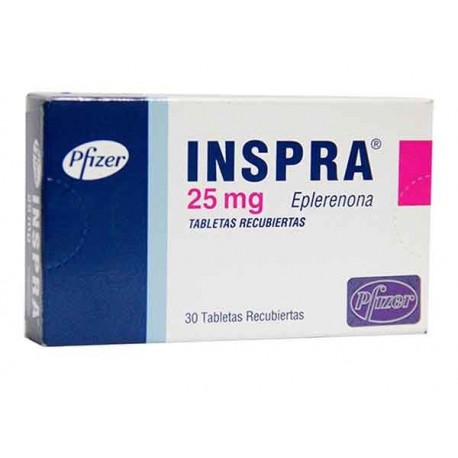 View larger
View larger Inspra (Eplerenone) 25 Mg 30 Film coated Tablets
INSP3374
New product
BUY MORE PAY LESS
| Quantity | Discount | |
|---|---|---|
| 2 | 5% | |
| 3 | 10% | |
| 4 | 15% | |
| 5 | 20% |
Volume discounts
| Quantity | Discount | You Save |
|---|---|---|
| 2 | 5% | Up to $3.90 |
| 3 | 10% | Up to $11.70 |
| 4 | 15% | Up to $23.40 |
| 5 | 20% | Up to $39.00 |
More info
INSPRA 25 mg film-coated tablet Taken orally.
Active ingredient
Each film tablet contains 25 mg eplerenone.
Excipients
Lactose monohydrate, microcrystalline cellulose (E460), croscarmellose sodium (E468), hypromellose (3 cp) (E464), sodium laurylsulfate, talc (E553b), magnesium stearate (E470b), HPMC 2910 / hypromellose 3cP (E464), HPMC 2910 hypromellose 6 cP (E464), titanium dioxide (E1 71), macrogol / PEG 400, polysorbate 80 (E433), iron oxide yellow (E172III), iron oxide red (E172III)
2.What is INSPRA and what is it used for?
INSPRA is a film coated tablet. Packaged in opaque polyvinyl chloride (PVC) / aluminum foil. Each box contains 30 tablets. Its active substance is eplerenone.
INSPRA belongs to a group of drugs called aldosterone antagonists that affect the cardiovascular system.
INSPRA is a medicine for adults who develop congestive heart failure after a heart attack. Congestive heart failure means that the heart is too weak to pump enough blood to the body. Fluid may accumulate in the lung or other parts of the body. INSPRA can help these patients survive. It can be used with other heart medications.
INSPRA can also be taken by adults with high blood pressure (hypertension). It lowers blood pressure on its own or in combination with other medications. Medicines that lower blood pressure also lower your risk of stroke or heart attack.
3.How to use INSPRA?
Instructions for proper use and dose / frequency of administration
Hypertension
The recommended starting dose of INSPRA is 50 mg once a day. The full therapeutic effect of INSPRA occurs within 4 weeks. In patients with insufficient blood pressure response to 50 mg once a day, the INSPRA dosage is increased to 50 mg twice a day. INSPRA at higher dosages is not recommended because it has no greater effect on blood pressure than 100mg and is associated with an increased risk of hyperkalaemia.
Heart failure - after myocardial infarction (MI)
INSPRA is usually administered in conjunction with standard treatments. The recommended dose of INSPRA is 50 mg once a day. Treatment is initiated at a dose of 25 mg once daily and titrated to the target dose of 50 mg once daily, preferably within 4 weeks, as tolerated by the patient and taking into account serum potassium levels.
Application route and method
It is taken orally.
INSPRA can be applied to hungry or full cam.
Use in children
There are insufficient data to recommend the use of eplerenone in the pediatric population; therefore, its use is not recommended in this age group.
Special use cases
No initial dose adjustment is required in patients with mild renal impairment.
Potassium levels should be regularly monitored in patients with impaired renal function, including diabetics with protein in the urine. Patients with a serum creatinine level greater than 2.5 mg / dL or a creatinine clearance less than 50 ml / min.
must be treated. As kidney function decreases, there is a risk of increased blood potassium level. Eplerenone is not removed by hemodialysis.
Liver failure:
No adjustment to the starting dose is required in patients with mild to moderate hepatic impairment.
If you have an impression that the effect of INSPRA is too strong or too weak, talk to your doctor or pharmacist.
If you use more INSPRA than you should
If you have used more than you should use from INSPRA, talk to a doctor or pharmacist.
4. What are the possible side effects?
Like all medicines, people who are sensitive to the substances contained in INSPRA may have side effects.
Hypertension
The most common reasons for discontinuing INSPRA in clinical studies are:
• Headache,
• dizziness,
Chest pain (angina pectoris) / heart attack (myocardial infarction) caused by narrowing / occlusion of the vessels supplying the heart
High GGT
The following adverse events have been obtained from hypertensive patients who received 25 to 400 mg of eplerenone.
Common: less than one in 10 patients, but more than one in 100 patients
Flu-like symptoms
High cholesterol (hypercholesterolemia), high triglycerides (hypertriglyceridemia)
Dizziness
Cough
Abdominal pain, diarrhea
Increase in liver enzymes
• The presence of albumin in the urine (albuminuria)
• Fatigue
If the blood potassium level is above normal (hyperkalaemia)
Heart failure after a heart attack:
Common: less than one in 10 patients, but more than one in 100 patients
If the blood potassium level is above normal (hyperkalaemia)
Dizziness
Low blood pressure (hypotension)
Diarrhea, nausea
Abnormal kidney function
Uncommon: less than one in 100 patients, but more than one in 1000 patients
Increase in the number of eosinophils (a type of allergy cell) in the blood (eosinophilia)
• Loss of water (dehydration), High cholesterol (hypercholesterolemia), high triglycerides (hypertriglyceridemia), low sodium level in the blood (hyponatremia)
Insomnia
• Headache

